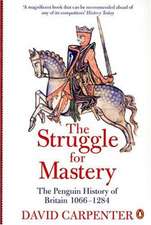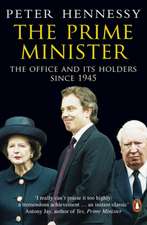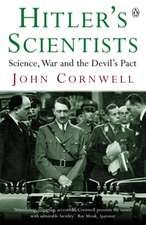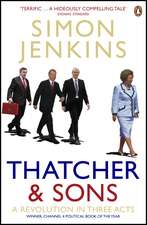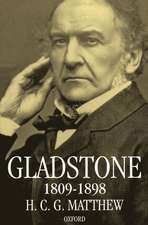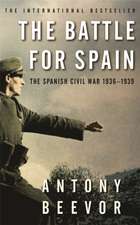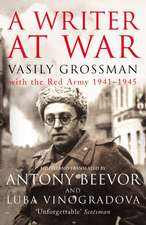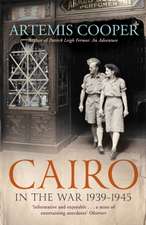Paris: After the Liberation 1944-1949
Autor Antony Beevor, Artemis Cooperen Limba Engleză Paperback – 31 iul 2004 – vârsta de la 18 ani
In this brilliant synthesis of social, political, and cultural history, Antony Beevor and Artemis Cooper present a vivid and compelling portrayal of the City of Lights after its liberation. Paris became the diplomatic battleground in the opening stages of the Cold War. Against this volatile political backdrop, every aspect of life is portrayed: scores were settled in a rough and uneven justice, black marketers grew rich on the misery of the population, and a growing number of intellectual luminaries and artists? including Hemingway, Beckett, Camus, Sartre, de Beauvoir, Cocteau, and Picasso?contributed new ideas and a renewed vitality to this extraordinary moment in time.
Preț: 138.98 lei
Nou
Puncte Express: 208
Preț estimativ în valută:
26.59€ • 27.77$ • 22.01£
26.59€ • 27.77$ • 22.01£
Carte disponibilă
Livrare economică 15-29 martie
Preluare comenzi: 021 569.72.76
Specificații
ISBN-13: 9780142437926
ISBN-10: 0142437921
Pagini: 436
Ilustrații: Two 8-page b/w photo inserts on text stock
Dimensiuni: 137 x 211 x 25 mm
Greutate: 0.39 kg
Ediția:Revizuită
Editura: Penguin Books
ISBN-10: 0142437921
Pagini: 436
Ilustrații: Two 8-page b/w photo inserts on text stock
Dimensiuni: 137 x 211 x 25 mm
Greutate: 0.39 kg
Ediția:Revizuită
Editura: Penguin Books
Cuprins
Paris: After the Liberation 1944-1949 Preface
Part One: The Tale of Two Countries
1. The Marshal and the General
2. The Paths of Collaboration and Resistance
3. The Resistance of the Interior and the Men of London
4. The Race for Paris
5. Liberated Paris
6. The Passage of Exiles
7. War Tourists and Ritzkrieg
8. The Epuration Sauvage
Part Two: L'etat, C'est De Gualle
9. Provisional Government
10. Corps Diplomatique
11. Liberators and Liberated
12. Writers and Artists in the Line of Fire
13. The Return of Exiles
14. The Great Trials
15. Hunger for the New
16. After the Deluge
17. Communists in Government
18. The Abduction of Charles XI
Part Three: Into the Cold War
19. The Shadow-Theatre: Plots and Counter-Plots
20. Politics and Letters
21. The Diplomatic Battleground
22, The Fashionable World
23. A Tale of Two Cities
24. Fighting Back against the Communists
25. The Self-Fulfilling Prophecy
26. The Republic at Bay
27. The Great Boom of Saint-Germain-des-Pres
28. The Curious Triangle
29. The Treason of the Intellectuals
Part Four: The New Normality
30. Americans in Paris
31. The Tourist Invasion
32. Paris sera toujours Paris
33. Recurring Fevers
References
Bibliography
Photographic Acknowledgments
Index
Part One: The Tale of Two Countries
1. The Marshal and the General
2. The Paths of Collaboration and Resistance
3. The Resistance of the Interior and the Men of London
4. The Race for Paris
5. Liberated Paris
6. The Passage of Exiles
7. War Tourists and Ritzkrieg
8. The Epuration Sauvage
Part Two: L'etat, C'est De Gualle
9. Provisional Government
10. Corps Diplomatique
11. Liberators and Liberated
12. Writers and Artists in the Line of Fire
13. The Return of Exiles
14. The Great Trials
15. Hunger for the New
16. After the Deluge
17. Communists in Government
18. The Abduction of Charles XI
Part Three: Into the Cold War
19. The Shadow-Theatre: Plots and Counter-Plots
20. Politics and Letters
21. The Diplomatic Battleground
22, The Fashionable World
23. A Tale of Two Cities
24. Fighting Back against the Communists
25. The Self-Fulfilling Prophecy
26. The Republic at Bay
27. The Great Boom of Saint-Germain-des-Pres
28. The Curious Triangle
29. The Treason of the Intellectuals
Part Four: The New Normality
30. Americans in Paris
31. The Tourist Invasion
32. Paris sera toujours Paris
33. Recurring Fevers
References
Bibliography
Photographic Acknowledgments
Index
Textul de pe ultima copertă
When Allied troops fought their way into Paris on August 25, 1944, they were greeted by the wildest scenes of joy Europe had ever witnessed. The following day, over a million people thronged the streets in a delirious atmosphere of freedom to watch General de Gaulle's triumphant march from the Arc de Triomphe to Notre Dame. There was a black edge to the exuberance, though. Hatreds from the Vichy era led to the settling of scores in a chaos of often wild justice. The period that followed was full of contrast and contradiction: Picasso, a multimillionaire, became the Communist Party's star recruit; an infatuation with American popular culture thrived amid virulent anti-Americanism; black marketeers grew rich on the misery of the population; literary and social life revived miraculously amid the poverty and dilapidation; Christian Dior revolutionized fashion with the extravagant use of material, and working-class women tore the clothes in outrage from one of his models. Arthur Miller observed of Paris, emotionally scarred by the Occupation, that "the moral, the literary, and the political were the same". Paris was the focal point in the opening stages of the Cold War, and in the new era of the atom bomb. Existentialists and Communists arguing in cafes sensed that history had entered a decisive phase. At a time when rumor was as powerful as fact, word of plots and counterplots proliferated, and France came to the brink of civil war. Paris After the Liberation is the first work to do justice to this extraordinary period. It is a landmark achievement, a brilliant fusion of politics, literary life, society, theater, fashion, and art woven into a rich and intimate account brimming withrevelation. Acclaimed historians Antony Beevor and Artemis Cooper (the granddaughter of England's first postwar ambassador to France) have drawn on an astonishing array of sources: unpublished diaries, letters, and photographs; interviews with many of the period's leading figures; and important material from archives in Paris, the United States, London, and Moscow, whose newly opened state papers have provided a wealth of completely fresh information, much of it startling. Paris After the Liberation brings to life a pivotal moment of world history, suffusing it with wit, anecdote, and brio. It is a brilliant and thoroughly enjoyable work of synthesis, a fitting celebration of the fiftieth anniversary of the liberation of Paris.
Descriere
From two renowned British historians comes a vivid and anecdotal history of the dazzling social, cultural, and political renaissance that occurred in the City of Lights after World War II. A fitting celebration for the 50th anniversary of the liberation of Paris.
Notă biografică
Antony Beevor was educated at Winchester and Sandhurst. A regular officer in the 11th Hussars, he served in Germany and England. He has published several novels, and his works of nonfiction include The Spanish Civil War; Crete: The Battle and the Resistance, which won the 1993 Runciman Award; Stalingrad: The Fateful Siege: 1942--1943; and Berlin: The Downfall, 1945. With his wife, Artemis Cooper, he wrote Paris: After the Liberation: 1944--1949. His book Stalingrad was awarded the Samuel Johnson Prize for Non-Fiction, the Wolfson History Prize, and the Hawthornden Prize in 1999. Artemis Cooper's work includes Cairo in the War 1939-1945 and Writing at the Kitchen Table, the authorized biography of Elizabeth David, both of which are published by Penguin. She has also edited two collections of letters: A Durable Fire: The Letters of Duff and Diana Cooper and Mr. Wu and Mrs. Stitch: The Letters of Evelyn Waugh and Diana Cooper. Her grandfather, Duff Cooper, was the first postwar British ambassador to Paris, and his private diaries and papers provide one of the previously unpublished sources for this book. Artemis Cooper and Anthony Beevor were both appointed Chevalier de l'Ordre des Arts et des Lettres by the French government. They are married and have two children.

